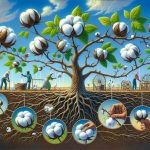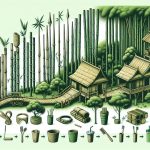I've found out that bamboo isn't just a plant; it's a powerhouse for community value! Economically, it drives growth and creates millions of jobs, really supporting local economies. Environmentally, it's a champ—absorbing CO2, improving soil, and acting as a sustainable biofuel source. Culturally, it connects people to their roots, being used in everything from crafts to cuisine. It's even essential in construction, providing affordable, sustainable solutions for housing and other structures. There's a lot to uncover about how bamboo plays a critical role in sustainable development and community resilience. Stick around, and I'll share even more fascinating insights!
Table of Contents
Key Takeaways
- Bamboo creates millions of jobs, enhancing economic stability in communities.
- It connects communities to cultural roots through traditional crafts and rituals.
- Used in sustainable construction, bamboo supports local economies and reduces costs.
- As a renewable resource, bamboo aids in community-led environmental conservation efforts.
- Bamboo fosters community resilience and growth by offering sustainable livelihood options.
Bamboo's Economic Impact
Bamboo often drives economic growth by creating millions of jobs and offering versatile, sustainable products. In countries like China, it's not just a plant; it's a booming industry that supports countless families and fuels local economies. The sheer scope of bamboo's economic opportunities is astounding, from traditional crafts to modern construction projects.
As someone who's delved into the world of sustainable materials, I've seen firsthand how bamboo transforms livelihoods. It's a cornerstone in architecture, favored for its strength and low cost. This makes bamboo an ideal choice for building projects, especially in areas where resources are scarce but human ingenuity isn't. Plus, its energy efficiency helps keep operational costs down, which is a big win for budget-conscious builders.
The bamboo industry isn't just about creating jobs; it's about crafting a sustainable future. By investing in bamboo, communities aren't just making an economic choice but a sustainable one. This commitment to sustainability helps ensure that these livelihoods are secure long-term, proving that what's good for the planet can also be great for our pockets.
Environmental Benefits
Beyond its economic value, I've also observed how significantly bamboo forests aid in environmental protection. These green giants are powerhouses in carbon dioxide absorption, tackling climate change head-on by sucking up CO2 from the atmosphere. It's not just about cleaning the air; bamboo plays a critical role in soil improvement too. I've seen areas prone to degradation turn around thanks to bamboo's ability to reduce nutrient depletion and control erosion.
Moreover, bamboo forests are vital in global carbon cycling. They don't just store carbon; they transform landscapes into resilient carbon sinks. In China, for instance, bamboo forests store massive amounts of carbon, showcasing their potential in climate change mitigation on a global scale.
Additionally, bamboo's benefits extend to being a sustainable biofuel source. With its high yield of lignocellulosic biomass, bamboo offers a promising alternative to fossil fuels, reducing our carbon footprint even further.
Considering all these factors, it's clear that bamboo isn't just a plant—it's a crucial ally in our fight against environmental degradation. Its role in carbon management and as a renewable resource underscores its invaluable contribution to ecological health and sustainability.
Cultural Significance
While we often focus on bamboo's environmental impact, its role in cultural traditions is equally profound. This plant isn't just about sustainable living; it's steeped in traditional practices and folklore across the globe. From Asia to the Americas, bamboo's cultural significance can be seen in everything from art to daily life.
Here's a quick glance at how bamboo enriches various cultural aspects:
| Aspect | Description | Community Impact |
|---|---|---|
| Art & Literature | Often symbolizes longevity and prosperity. | Inspires and enriches community heritage. |
| Music & Dance | Used in traditional instruments and rituals. | Fosters a unique cultural identity. |
| Crafts | Essential material for versatile crafts. | Supports local economies and skills. |
| Daily Life | Integral in cuisine and medicine. | Enhances practical, everyday practices. |
Bamboo's versatility as a resource is clearly more than just its physical applications; it's a symbol of strength and resilience. Each use and representation of bamboo in folklore and tradition not only connects communities to their roots but also highlights a commitment to living harmoniously with nature. In essence, bamboo isn't just a plant; it's a pivotal part of cultural heritage and a testament to the adaptability and ingenuity of human societies.
Bamboo in Construction
I've learned that over a billion people worldwide choose bamboo as their primary building material, thanks to its affordability and sustainability. It's fascinating how this plant has transformed construction practices, especially in regions that prioritize eco-friendly and cost-effective solutions.
Bamboo's role in construction isn't just limited to housing. Its versatility extends to various other demanding applications:
- Road Reinforcements: In India, bamboo is utilized to reinforce roads, proving its structural strength and adaptability.
- Bridges: In China, bamboo bridges are capable of supporting heavy trucks up to 16 tons, demonstrating not only its durability but also its significant load-bearing capacity.
- Scaffolding: Globally, bamboo scaffolding is favored for being an environmentally sustainable material that also reduces costs in construction projects.
What strikes me most is how bamboo aligns with the needs of both today and tomorrow. As a sustainable material, it stands out not only for its affordability but also for its robustness in construction scenarios. This makes bamboo a key player in building a more sustainable and resilient future, ensuring that communities not only survive but thrive.
Bamboo Products and Innovation
I've noticed that bamboo isn't just for building anymore; it's popping up in everything from clothes to cutting boards.
The way we're crafting these products sustainably is really making a difference in both the economy and the environment.
It's exciting to see such a versatile material take on new roles and offer so many benefits.
Sustainable Bamboo Crafting Methods
Exploring sustainable bamboo crafting methods, artisans are turning to eco-friendly techniques that both preserve our environment and enhance local economies. By tapping into bamboo's rapid growth, I've seen firsthand how these practices minimize ecological footprints while boosting local job markets.
Here's what makes bamboo crafting truly sustainable:
- Minimal Waste Production: Techniques are designed to utilize almost every part of the bamboo plant.
- Energy Efficiency: Many processes rely on simple, manual tools which reduce energy consumption.
- Community Engagement: Projects often involve local people, providing substantial employment opportunities and fostering community development.
As these methods evolve, bamboo products not only become more innovative but also reinforce the economic stability of the communities involved. It's a win-win for both the planet and its people.
Diverse Bamboo Product Uses
Bamboo's versatility shines through its myriad uses, from sturdy construction materials to innovative medicinal applications. It's not just about building houses or bridges; the scope extends to everyday items and healthcare. In construction, bamboo's strength and durability make it a go-to for scaffolding and even intricate furniture.
When I look at textiles, bamboo fabric stands out for its comfort—breathable, moisture-wicking, and even odor-resistant. It's a fabric I'd choose any day for comfort and sustainability.
In the culinary world, bamboo shoots add a crunch to my meals, while bamboo vinegar enhances flavors uniquely. Medicinally, it's a game-changer, treating everything from kidney diseases to more severe health issues. Bamboo products truly embody innovation and versatility.
Economic Impact of Bamboo
The bamboo industry drives economic growth and creates millions of jobs worldwide. It's not just about traditional livelihoods anymore; bamboo is booming in sectors like architecture and construction. This shift is largely due to its sustainable qualities and economic efficiency.
Here's why bamboo is making waves:
- Architecture: Bamboo's flexibility and strength make it a prime choice for innovative building designs.
- Construction: Its low cost and high performance are ideal for modern construction needs.
- Economic Value: Particularly in places like China, the bamboo industry significantly boosts the local economy.
Understanding the economic impact of bamboo can really highlight its role in both traditional and contemporary settings, proving it's much more than just a plant.
Sustainability and Renewability
I find it fascinating how bamboo serves as a sustainable and renewable resource, ready for harvest every four years. Its role in sustainability and renewability is profound due to its fast growth rate, exceptional carbon dioxide absorption, and ability to prevent soil erosion. Here's a quick breakdown in a simple table:
| Feature | Benefit | Impact on Sustainability |
|---|---|---|
| Fast Growth Rate | Harvest-ready in just 4 years | Rapid resource renewal |
| Carbon Dioxide Absorption | Absorbs more CO2 than many plants | Helps mitigate climate effects |
| Soil Erosion Prevention | Roots stabilize soil | Preserves vital ecosystems |
These characteristics make bamboo a standout in the sustainability arena. It's not just about growing quickly; it's how it contributes significantly to the environmental balance, making it a key player in sustainable development strategies. With bamboo, communities can tackle issues like land degradation while also enhancing their green credentials. Isn't it amazing how this plant does so much, yet asks for so little? Truly, bamboo is not just a plant; it's a powerhouse in our pursuit of a more sustainable world.
Bamboo and Climate Change
In tackling climate change, bamboo forests are vital as they absorb CO2 and store carbon effectively. This powerful plant acts as a natural carbon sink, making a significant impact on our efforts to reduce atmospheric carbon dioxide. Here's why I'm convinced that integrating bamboo into our environmental strategies is crucial:
- Carbon Storage: Bamboo forests in regions like China have shown immense potential in storing large amounts of carbon, which helps offset emissions from fossil fuels.
- Soil Protection: By improving soil quality and preventing erosion, bamboo supports healthier ecosystems that are more resilient to climate change.
- Sustainable Biofuel: Given its rapid growth and high yield of lignocellulosic biomass, bamboo can be transformed into biofuel, providing a cleaner, renewable energy source that's crucial for sustainable development.
The role of bamboo in absorbing CO2 and its overall contribution to climate mitigation can't be overstated. It's not just about reducing carbon dioxide; it's about creating sustainable systems that support our planet's health long-term.
As we push forward, the potential of bamboo as both a carbon sink and a source of biofuel highlights its dual benefits in our fight against climate change.
Community Development Initiatives
Now, let's talk about how bamboo is sparking community development initiatives.
It's not just about growing plants; it's creating real economic opportunities and jobs.
Plus, bamboo serves as a sustainable building material that's both eco-friendly and practical.
Bamboo Economic Opportunities
Bamboo's economic potential boosts community development through job creation and sustainable livelihoods. The bamboo industry isn't just about growing plants; it's a powerhouse of economic opportunities that can transform local economies, especially in developing countries.
- Job Creation: It generates millions of jobs globally, tapping into everything from cultivation to product manufacturing.
- Sustainable Livelihoods: Bamboo offers a renewable, eco-friendly way for communities to earn a living, ensuring long-term economic stability.
- Community Development: By investing in bamboo, communities see enhanced growth, better environmental conservation, and improved social well-being.
I'm seeing firsthand how bamboo's low-cost, high-yield nature propels community upliftment, making it a key player in sustainable development.
Sustainable Building Material
Exploring bamboo as a sustainable building material opens up numerous community development opportunities. It's an eco-friendly alternative that's changing the game in construction projects. By utilizing bamboo, we're minimizing our environmental impact while boosting local economies.
This rapid-growing plant allows for quicker and more cost-effective building methods compared to traditional materials. Plus, it's not just about being green. Bamboo's durability and versatility in various applications enhance community infrastructures and foster resilience.
Local Employment Growth
Delving into how bamboo boosts local employment, it's clear that this versatile plant isn't just good for the environment, but it's also a powerhouse for job creation in our communities. The bamboo industry significantly drives economic growth by offering a range of sustainable job opportunities. Here's how:
- Diverse Workforce Engagement: From cultivation to product development, bamboo supports a wide array of jobs within the community.
- Economic Empowerment: Local employment in bamboo production helps lift communities, reducing poverty and promoting self-sufficiency.
- Community-based Initiatives: These programs focus on skill development and sustainable practices, ensuring long-term benefits for local economies.
Frequently Asked Questions
How Does Bamboo Benefit Society?
Bamboo benefits society by providing sustainable jobs and income. It's critical for poverty alleviation and environmental conservation, offering resources like food and building materials, while promoting local and international economic growth.
Why Is Bamboo Important to the Environment?
Bamboo's crucial for the environment because it absorbs CO2, stores carbon, and improves soil quality. Its rapid growth and strength also make it ideal for sustainable industrial uses and combating climate change.
What Are the Values of Bamboo?
Bamboo's values are vast; it's an economic driver, environmental protector, and culturally significant. It offers sustainable alternatives in construction, textiles, and medicine, deeply enriching the communities that cultivate and utilize it.
What Is the Cultural Value of Bamboo?
Bamboo's cultural value is immense. It symbolizes strength and flexibility, enriching rituals and crafts, and is pivotal in Asian art and architecture, embodying prosperity and protection. It's truly central to my cultural heritage.
- How Does Ring Spun Cotton Affect Garment Fit and Shape Retention? - August 13, 2024
- What Are the Challenges in Producing Ring Spun Cotton? - August 13, 2024
- Is Ring Spun Cotton Suitable for Plus-Size Clothing? - August 13, 2024







